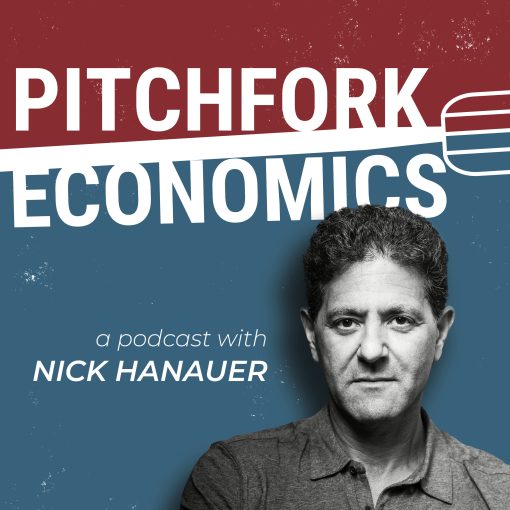As Republicans work at break-neck speed to push another round of massive tax cuts for the wealthy, we thought it would be a good idea to revisit our 2019 conversation with Bruce Bartlett, a Reagan policy adviser and key architect of the 1981 tax cuts. Bartlett explains how the trickle-down logic he once championed turned out to be economic snake oil, because tax breaks for the wealthy don’t grow the economy—they just grow inequality.
Why Gutting SNAP Makes the Economy Worse for Everyone (with Lily Roberts)
The GOP’s new tax bill isn’t just a massive giveaway to the rich—it’s an all-out assault on SNAP, one of the most effective anti-poverty programs in the U.S. That’s because SNAP is more than just a program designed to end hunger. It’s also a powerful economic engine, stabilizing local economies as well as supporting retailers and farmers. Lily Roberts from the Center for American Progress joins us to break down how these proposed cuts will deepen poverty, weaken economic resilience, and hurt millions—especially in the very communities whose lawmakers are pushing them.
Good Company: Ending the Era of Shareholder Supremacy (with Lenore Palladino)
What makes a company good—and who gets to decide? Economist Lenore Palladino joins Nick and Goldy to dismantle the myth of shareholder primacy and explain how our current system of corporate governance has warped innovation, deepened inequality, and undermined democracy. Drawing from her new book Good Company: Economic Policy after Shareholder Primacy, Palladino outlines a bold vision for how we can redesign the rules of the game—so corporations serve workers, communities, and the public good, not just wealthy shareholders.
The Empire Strikes Back—With More Billionaire Tax Breaks (with Samantha Jacoby)
With Trump’s second major tax bill clearing committee and heading to the House floor—packed, as promised, with massive giveaways to the ultra-wealthy—we’re revisiting our timely conversation with Samantha Jacoby of the Center on Budget and Policy Priorities. Originally recorded before Trump’s reelection, this episode breaks down the real impact of the tax bill that Trump signed into law back in 2017: trillions added to the deficit, corporations and billionaires cashing in, and working families left behind.
Greedflation 2.0: How Tariffs Could Become an Excuse for Corporate Price Gouging (with Hal Singer)
During COVID, corporations blamed supply chain shocks for rising prices while quietly raising prices higher than costs, thereby boosting their profits to record levels. We know they did this because they bragged about doing it on corporate earnings calls. Economist Hal Singer warns that Trump’s proposed tariffs could spark a repeat, giving corporations another “golden opportunity” to jack up prices under the guise of higher costs. He explains why tools like antitrust enforcement and interest rate hikes aren’t enough to stop price gouging—and why failing to curb greedflation could carry a steep political price.
Why Democracy Needs a New Operating System (with K. Sabeel Rahman)
Decades of trickle-down thinking hollowed out our government—and now the anti-democracy crowd is finishing the job. This week, legal scholar and former Biden advisor K. Sabeel Rahman joins Nick and Goldy to talk about what happens when the rule of law becomes optional, what the Biden administration got right (and what it didn’t,) and why simply restoring the old system isn’t enough. If we want a real democracy—one that can stand up to corporate power and actually deliver for people—we need to stop playing by outdated rules and start constructing a government that’s faster, fairer, and fit for the modern world.
Democracy in Chains (with Nancy MacLean)
This week, we’re revisiting a critical conversation we had back in 2020 with author and historian Nancy MacLean, in which she exposes how today’s threats to democracy were decades in the making. Based on her groundbreaking book Democracy in Chains, MacLean traces how Nobel Prize-winning economist James Buchanan worked with billionaire donors to rig the rules of government to expand corporate power and protect extreme wealth. From public choice theory to voter suppression, this episode reveals the coordinated strategy to undermine democracy—and explains why understanding it is essential to fighting back.
The Abundance Doctrine (with Mike Konczal)
What does “abundance” actually mean—and who is it really for? In this episode, Goldy and Paul welcome back economic policy expert Mike Konczal to unpack the big new idea dominating political discourse: abundance. They dive into the buzz around Ezra Klein and Derek Thompson’s book “Abundance,” and Konczal’s sharp critique of its deregulatory leanings, missed opportunities, and neoliberal undertones. From housing policy to green energy to the myth that deregulation alone can fix America’s problems, this episode challenges the idea that more is always better, and asks what it would really take to build a future that’s abundant for everyone—not just the rich.
Why Nothing Works: Who Killed Progress—and How to Bring It Back (with Marc Dunkelman)
Why does it feel like we can’t build anything anymore? In this episode, Nick and Goldy talk with author Mark Dunkelman about his new book Why Nothing Works, which examines how well-intentioned progressive reforms created a “vetocracy” that makes major public projects nearly impossible. From Seattle’s decades-long waterfront rebuild to the dysfunction of Penn Station, they explore the messy trade-offs between accountability and action—and ask what it would take to make progress possible again.
Live From DC: Turning Middle-Out Economics into Good Politics
Timid tweaks won’t fix a broken economy. From Nick Hanauer’s blunt critique of Democratic incrementalism to a candid conversation with Representatives Ro Khanna, Delia Ramirez, and Jim Himes on how Democrats can reclaim working-class trust by embracing economic populism and fighting for real change, this episode brings you inside the 2025 Middle Out Economics conference, where the message was clear: Go big or get out of the way.




